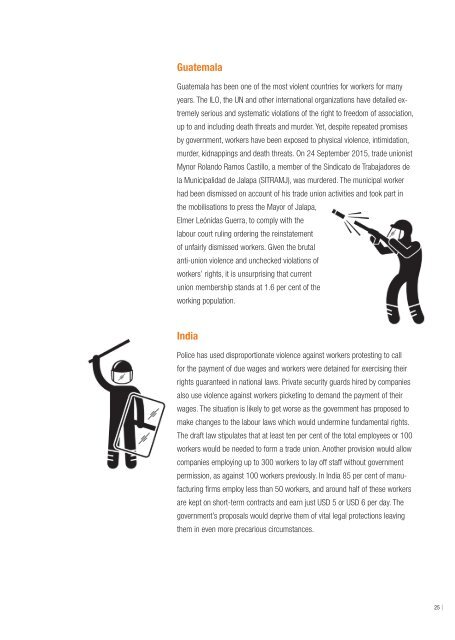ITUC GLOBAL RIGHTS INDEX
1RZ0UUH
1RZ0UUH
You also want an ePaper? Increase the reach of your titles
YUMPU automatically turns print PDFs into web optimized ePapers that Google loves.
Guatemala<br />
Guatemala has been one of the most violent countries for workers for many<br />
years. The ILO, the UN and other international organizations have detailed extremely<br />
serious and systematic violations of the right to freedom of association,<br />
up to and including death threats and murder. Yet, despite repeated promises<br />
by government, workers have been exposed to physical violence, intimidation,<br />
murder, kidnappings and death threats. On 24 September 2015, trade unionist<br />
Mynor Rolando Ramos Castillo, a member of the Sindicato de Trabajadores de<br />
la Municipalidad de Jalapa (SITRAMJ), was murdered. The municipal worker<br />
had been dismissed on account of his trade union activities and took part in<br />
the mobilisations to press the Mayor of Jalapa,<br />
Elmer Leónidas Guerra, to comply with the<br />
labour court ruling ordering the reinstatement<br />
of unfairly dismissed workers. Given the brutal<br />
anti-union violence and unchecked violations of<br />
workers’ rights, it is unsurprising that current<br />
union membership stands at 1.6 per cent of the<br />
working population.<br />
India<br />
Police has used disproportionate violence against workers protesting to call<br />
for the payment of due wages and workers were detained for exercising their<br />
rights guaranteed in national laws. Private security guards hired by companies<br />
also use violence against workers picketing to demand the payment of their<br />
wages. The situation is likely to get worse as the government has proposed to<br />
make changes to the labour laws which would undermine fundamental rights.<br />
The draft law stipulates that at least ten per cent of the total employees or 100<br />
workers would be needed to form a trade union. Another provision would allow<br />
companies employing up to 300 workers to lay off staff without government<br />
permission, as against 100 workers previously. In India 85 per cent of manufacturing<br />
firms employ less than 50 workers, and around half of these workers<br />
are kept on short-term contracts and earn just USD 5 or USD 6 per day. The<br />
government’s proposals would deprive them of vital legal protections leaving<br />
them in even more precarious circumstances.<br />
25 |



